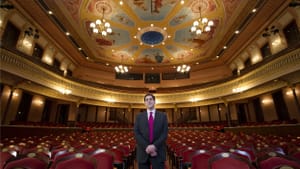Stay in the Loop
BSR publishes on a weekly schedule, with an email newsletter every Wednesday and Thursday morning. There’s no paywall, and subscribing is always free.
Amo, Amas, Amado
'Spring Nights' by the Delaware Symphony Orchestra

When David Amado became the conductor of the Delaware Symphony Orchestra in 2003, the symphony had come a long way since its humble beginnings as the Tankopanikum Orchestra of the 19th century, but it was still a divergent group of excellent musicians. The conductor of a part-time orchestra faces the challenge of creating a unified sound from a group who doesn’t play for him or her exclusively — they have to work many other gigs to make ends meet.
But the musicians all agreed in 2003 that they loved Amado and were wholly behind the choice of their new conductor. There were, of course, times when the conductor and his musicians were not always in agreement, but, like any relationship, those rough edges were smoothed out over time.
The maestro also had to contend with the wants and desires of donors and an aging audience who were horrified by a musical diet containing works by the likes of Henry Gorecki, Steve Reich, Toru Takemitsu, and Michael Dougherty. And there were money issues, organizational issues and enough headaches to make the job seem like hell on earth, but he stuck with it.
David Amado has won over his musicians by donating part of his salary to the symphony, having an open ear to their musical desiderata, finding venues that were affordable for a symphony on the brink of financial disaster, presenting the DSO’s own excellent musicians as soloists, and being exceptionally devoted to spreading the gospel of music. He demands much of the symphony musicians, but also demands much of himself, serving as pianist and musical colleague in the Hotel Dupont Chamber Series. Amado can play the most difficult Shostakovich chamber work or bedevil a seemingly simple Schubert song by bringing out a hidden middle voice of thirds, voicing the chords to show the intent of the composer.
Amado has been meticulous in providing well-researched pre-concert talks, bringing in guests from the community. Claiming to be a non-practicing Jew, Amado invited Rabbi Michael Beal, a knowledgeable and engaging speaker, to explain the religious issues in Gustav Mahler’s life and their influence on his music to introduce a performance of Mahler’s Resurrection Symphony. Hearing the lively exchange between the Rabbi and the maestro made me imagine a conversation between God and Catholic convert Mahler.
Tangible results
The conductor’s dogged insistence on bringing out the best in his orchestra has yielded tangible results, which were illustrated by the performances of the April concert series. This year’s A.I. DuPont Composer, Christopher Theofanidis, presented Dreamtime Ancestors. The piece was both exciting and modern, yet kept within tonal traditions enough to be hummable and memorable, with the final sustained vibraphone pitch resounding in a quiet auditorium as the audience held their breath. Brian Brown, DSO tubist, played a delightful but little known Concerto for Tuba by Ralph Vaughan Williams. The sound was clear, with both tuba and orchestra in dynamic balance and sharing the musical spotlight in all three movements.
After the intermission, the Rimsky-Korsakov version of Modest Mussorgsky’s Night on Bald Mountain was the first step on the road to the musical sublime. The orchestra reached the summit with a stunningly vibrant rendition of Igor Stravinky’s Petruschka (1947), in which one could hear the work of the past 13 years. Amado was the lightning rod keeping the orchestra together in the challenging counter-rhythms, contrasting keys, swiftly changing themes, and phantasmagoric musical language of Stravinsky’s mystical manufacture. Everything came together: all of the wild entrances, quick crescendos, and groups playing different meters and keys. The solo passages were easily heard with both the dynamic control of the symphony and the brilliant Stravinsky orchestration making space for the featured musical lines.
It is clear that after years of working together, Maestro Amado and his orchestra have created a musical synergy that is well worth hearing.
What, When, Where
Spring Nights. The Delaware Symphony Orchestra with Brian Brown, tuba. Christopher Theofanidis (A.I.duPont Composer Award Recipient): Dreamtime Ancestors, Mussorgsky: Night on Bald Mountain, Stravinsky, Petruschka (1947). Laird Performing Arts Center, Tatnall School, 1501 Barley Mill Rd, Wilmington, Delaware. 302.656.7442 or delawaresymphony.org.
Sign up for our newsletter
All of the week's new articles, all in one place. Sign up for the free weekly BSR newsletters, and don't miss a conversation.

 Margaret Darby
Margaret Darby